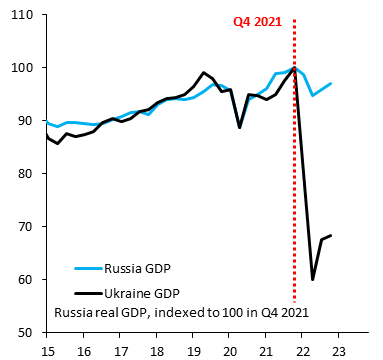May 1: Robin Brooks: We need to sanction all Russian banks
Thread published on April 29, 2023
Robin Brooks, We need to sanction all Russian banks
I had read this thread when it was published, but I’m not a financial wizz so I asked someone who is to read through it, and see if its premise and arguments are sound. I was given the green light, so here it is.
I’ll add that the international business community has had over 15 months to get their house in order for harsh economic measures against Russia, such as sanctioning all Russian banks, which would then lead to a defacto complete trade embargo. Would the Ukrainian counteroffensive coupled with a complete trade embargo bring Russia to a screeching halt?
This thread has captured the interest of many analysts in the international community. Alicia Kearns, a Conservative MP who is chair of the foreign affairs select committee at the HoC in the UK, has commented on it this morning. I hope it continues getting the traction it deserves.
2. Root problem is an infatuation with financial sanctions. These can be effective when used on current account deficit countries - Turkey in 2018 is an example - but they don't work on current account surplus countries. This is a key point that cannot be emphasized enough.
3. Russia shows how our financial sanctions failed. We sanctioned some banks, including the central bank (red), but not all. This meant that all the cash from Russia's current account surplus got routed through non-sanctioned Russian banks (blue). Putin still got all his cash...
4. So our financial sanctions did not prevent Putin getting all his cash in return for energy exports. All this cash just got routed through different banks than before. As a result, financial conditions in Russia eased back to pre-war levels, a big plus for Russia's war economy.
5. We could have avoided this, but it would have required sanctioning ALL Russian banks. That's the same as a trade embargo, since Putin no longer gets paid and stops exporting. This shows what's needed to hurt c/a surplus countries: a trade embargo! Not financial sanctions...
6. Number one lesson from Russia is that our infatuation with financial sanctions must end. They don't work on c/a surplus countries, unless we sanction all banks, in which case we're just doing a trade embargo. We need to be doing trade embargos instead of financial sanctions...
7. Had we done a hard energy embargo on Russia, this would have come at a cost to the West, but Russia would have gone into financial crisis, making the war harder for Putin to fight. An embargo would have also scared other potentially hostile current account surplus countries.
8. It's not too late. First, the West needs to end its focus on financial sanctions. Second, we need to start talking about hard trade-offs that are needed to confront c/a surplus countries. We need to stop giving them cash, which means we need to stop buying their stuff...
9. A footnote on the G7 oil price cap. The cap is recognition of the fact that Russia's current account surplus needs to be cut. But - thanks to Greek shipping oligarchs - the cap was set at $60 and wasn't binding. A mistake that can be fixed now by lowering the cap...
Do sanctions have any effect on Russia?
This was the question I had after I read the thread. Is Brooks implying that the sanctions had absolutely no effect on the Russian economy? He had an exchange with someone and answered that question.
That’s the key, really: stop Russia’s aggression on Ukraine and its people. Stop the killing, the torture, the kidnappings, the rape, the destruction of cultural heritage and the economy. The impetus to stop the Russian leadership and forces won’t come from inside. Forget it. The Russian population outside of Moscow and St Petersburg have lived in substandard conditions for a very long time. They are not going to oppose the leader or his inner circle.
Ukraine and her allies must, and will do. We should be working quickly to this end.










